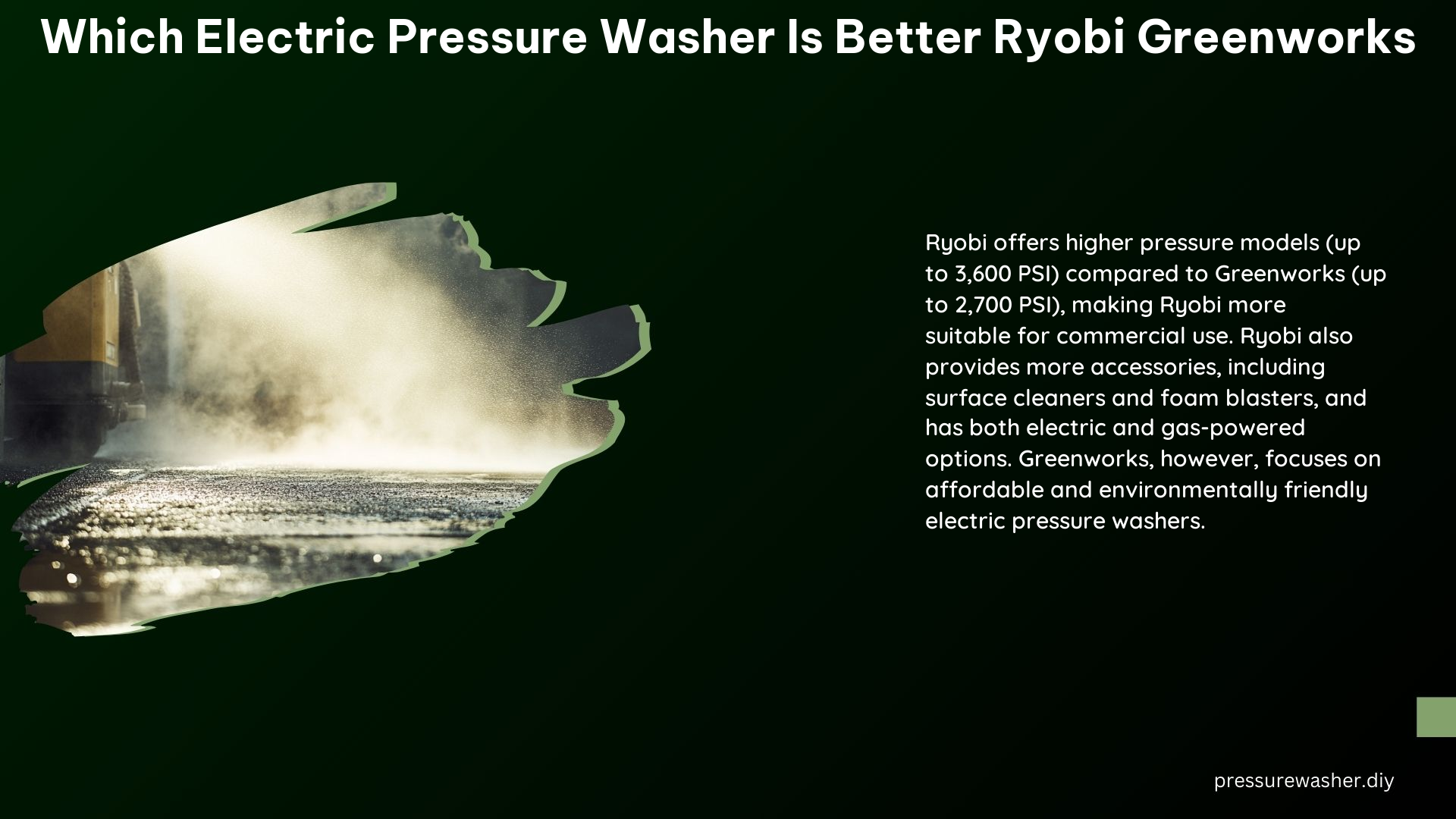When it comes to choosing between Ryobi and Greenworks electric pressure washers, several factors come into play, including power, environmental impact, user-friendliness, and durability. This comprehensive guide will delve into the nuances of each brand, providing you with the information you need to make an informed decision.
General Cleaning Tasks
Ryobi RY142500 2500 PSI Electric Pressure Washer
- Power: The Ryobi RY142500 boasts a powerful 2500 PSI rating, making it well-suited for a wide range of general cleaning tasks. However, it falls short of the Greenworks Pro GWP2700’s 2700 PSI rating.
- Flow Rate: With a flow rate of 1.2 GPM, the Ryobi RY142500 has a lower water output compared to the Greenworks Pro GWP2700’s 2 GPM.
- Motor: The Ryobi RY142500 features an induction motor, which is known for its quieter operation and increased durability compared to universal motors.
- Convenience: The Ryobi RY142500 excels in user-friendliness, with its extra-large wheels and well-designed GFCI plug for easy maneuvering and safe operation. It also offers better storage solutions for the hose, cord, and wand.
Greenworks Pro GWP2700 2700 PSI Cold Water Electric Pressure Washer
- Power: The Greenworks Pro GWP2700 boasts a higher 2700 PSI rating, providing more power for tougher cleaning tasks.
- Flow Rate: With a 2 GPM flow rate, the Greenworks Pro GWP2700 offers a higher water output compared to the Ryobi RY142500’s 1.2 GPM.
- Sustainability: The Greenworks Pro GWP2700 is more environmentally friendly, as it is an electric-powered pressure washer, making it a greener choice.
- Ergonomics: The Greenworks Pro GWP2700 has a unique handle orientation that can make it challenging to maneuver on stairs or uneven surfaces.
Outdoor Cleaning Tasks

Ryobi 1800 PSI Pressure Washer
- Power: The Ryobi 1800 PSI Pressure Washer offers a lower PSI rating (1800) compared to the Greenworks 1800 PSI (1800 PSI).
- Flow Rate: The Ryobi 1800 PSI Pressure Washer and the Greenworks 1800 PSI both have a similar flow rate of 1.2 GPM.
- Versatility: The Ryobi 1800 PSI Pressure Washer is more versatile, as it comes equipped with a turbo nozzle and a soap applicator, allowing for a wider range of outdoor cleaning tasks.
- Performance: Despite the slightly lower PSI rating, the Ryobi 1800 PSI Pressure Washer performs equally well as the Greenworks 1800 PSI for outdoor cleaning tasks.
Durability and Reliability
Ryobi
- Materials: Ryobi uses quality materials in the construction of its pressure washers, making them more durable and long-lasting.
- Product Lineup: Ryobi offers both electric and gas-powered pressure washer models, providing customers with more options to choose from.
- Accessories: Ryobi has a wider range of accessories available, including surface cleaners and foam blasters, enhancing the versatility of its pressure washers.
Greenworks
- Focus: Greenworks primarily focuses on producing efficient and affordable electric pressure washers, rather than offering gas-powered or cordless options.
- Accessories: Greenworks has a more limited selection of accessories available, making its pressure washers less versatile compared to Ryobi’s offerings.
Technical Specifications
| Specification | Ryobi RY142500 | Greenworks Pro GWP2700 | Ryobi 1800 PSI | Greenworks 1800 PSI |
|---|---|---|---|---|
| PSI | 2500 | 2700 | 1800 | 1800 |
| GPM | 1.2 | 2 | 1.2 | 1.2 |
| Motor | Induction | Not specified | Not specified | Not specified |
| Weight | Not specified | Not specified | Not specified | Not specified |
| Price | $299 | Not specified | $99 | $99 |
Conclusion
The choice between Ryobi and Greenworks electric pressure washers ultimately depends on your specific needs and preferences. If you require higher power and a wider range of accessories, the Ryobi pressure washers may be the better option. On the other hand, if you prioritize environmental sustainability and ease of use, the Greenworks pressure washers could be the more suitable choice.
